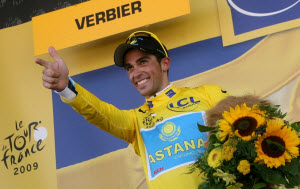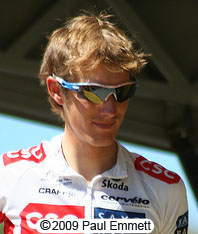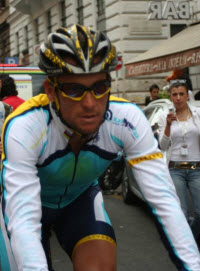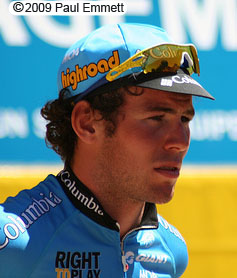There can only be one winner of next year’s Tour, but the reactions from today’s route presentation in Paris have been almost completely positive. Some will like the route more than others, some will have preferred a different design, yet everyone will walk away telling themselves that they will benefit in some way from the parcours.
 It’s a hilly route, with no team time trial and just one long individual test. Defending champion Alberto Contador has given it the thumbs up. “I like the course,” the Spaniard said. “It will be a better Tour for climbers than for rouleurs. Honestly, I would have preferred the time trial to be ten kilometres shorter and a second one of twenty or thirty kilometres, but I am really happy about the course.
It’s a hilly route, with no team time trial and just one long individual test. Defending champion Alberto Contador has given it the thumbs up. “I like the course,” the Spaniard said. “It will be a better Tour for climbers than for rouleurs. Honestly, I would have preferred the time trial to be ten kilometres shorter and a second one of twenty or thirty kilometres, but I am really happy about the course.
He said that he will have to be vigilant early on, ensuring that he doesn’t lose time before he can hit his main rivals where it hurts; in the mountains. “It will be a very difficult race to control in the first week. It is particularly difficult with the Paris-Roubaix cobblestones, but I don’t give it too much importance. The most important thing will be not to crash, so I hope it will not rain there.
“The Alpine stages will be less hard. The Pyrenees will be twice as hard as this year, especially with the double climb of the Tourmalet, one of them with a mountaintop finish. I will go to see those stages in order to know more about them.”
 Andy Schleck finished as runner-up to Contador this year, conceding the bulk of his four minute eleven second deficit in the individual and team time trials. He’s consequently pleased with the look of next year’s race, as is his Saxo Bank team manager Bjarne Riis.
Andy Schleck finished as runner-up to Contador this year, conceding the bulk of his four minute eleven second deficit in the individual and team time trials. He’s consequently pleased with the look of next year’s race, as is his Saxo Bank team manager Bjarne Riis.
“There are some risky elements in the Netherlands and Belgium where we must be careful not to lose unnecessary time,” the Luxemburger said. “However, it appears that the route is harder than this year’s Tour and I could have a better chance of gaining time in the mountains and losing less time on the long time trial. I’m going for the overall victory next year, but it’s clear that Contador is the biggest favourite while Lance may be more motivated than ever.”
Riis said that overall, he considered the layout of the 2010 as being a “very excellent” itinerary for us.
“I think that next year’s route is very interesting. I am happy to see that the mountain stages seem harder and the mountains are positioned later on each stage so they can be used for attacks. Obviously, I would like to have a team time trial but it is in our favour that there is only one long time trial. Last but not least, we must be very careful and aware on stage three passing the cobblestones.”
That section is precisely where Lance Armstrong can be expected to try to gain some time on his key rivals. While he was a little stronger than Schleck in the time trials this year, he was beaten in both individual tests by Contador, and lost out to both riders in the high mountains. The Texan is hoping that this full season will give him additional strength next year, but will also seek to use the tough first week to try to gain time over the climbers.
 “I think it’s an interesting course. It starts in an exciting way,” he said. “The first few days will provide a lot of drama for people between the crosswinds in Holland and the hills in and around Brussels and Spa. Of course, so too with the cobblestones when we first come into France. The cobbles themselves are dangerous but what is even more dangerous is the approach to them; the kilometers before, the nerves, the anticipation before, the positioning, that is the most dangerous part.
“I think it’s an interesting course. It starts in an exciting way,” he said. “The first few days will provide a lot of drama for people between the crosswinds in Holland and the hills in and around Brussels and Spa. Of course, so too with the cobblestones when we first come into France. The cobbles themselves are dangerous but what is even more dangerous is the approach to them; the kilometers before, the nerves, the anticipation before, the positioning, that is the most dangerous part.
“You need obviously a well-rounded team but I think you have to take some big guys who can definitely support you in that first week because with the cobble sections you have to be in the front. I remember we did those sections in 2004 and I had great support from Ekimov and Hincapie. We came in the cobble zones first. It makes a big difference.”
The Texan said that he regretted the lack of a team time trial and suggested that this will mean that more riders are contenders for the final classification. That will increase the suspense, and so too the way the race builds up towards a big finale on the Tourmalet.
“I think the organizers like what they had this year with a summit finish so late in the race,” he said. “It keeps things close, it keeps everybody guessing. It keeps the riders sharp too. The race will not be decided before the last three or four days. Two times on the Tourmalet is unique too. I like it.”
Armstrong will be heading towards his 39th birthday by the time he lines out at the start in Rotterdam. Despite that, he said that he will head there determined to win the race. “I’m excited for the whole upcoming season. I like to think that I will be better than last year but Alberto has shown that he is the best in his sport right now; he will be tough to beat.”
His manager Johan Bruyneel is still trying to officially leave Astana and commence working with Armstrong’s new Radio Shack team. That’s proving to be a tougher task than expected, but he’ll hope to have everything sorted out by the beginning of next season.
“I think it’s a very traditional course. There is a little bit less time trialing than normal but, other than that, there are no surprises,” he said. “In the beginning the stage with the cobblestones can be tricky but other than that, it is very predictable. It’s a pity that there is no team time trial.”
Other reactions:
Cadel Evans failed to shine in this year’s Tour but made up for that when he finished third overall in the Vuelta a España and then took an excellent victory in the world road race championship. He wasn’t at the presentation as he will ride the Giro del Piemonte tomorrow, but gave a brief reaction on Twitter. “The TDF ‘10 looks more suitable to climbers than in the past,” he stated. It’s an admission that it may not please him, as he’s generally good against the clock as well as strong in the mountains.
 Two riders who will not relish the climbs are sprinters Mark Cavendish and Thor Hushovd. Cavendish won six stages this year but plays down his chances of repeating the feat. “It’s not possible next year, no” he told AFP. “I’d never say never but I think that’s unlikely. There’s five sprints (opportunities), all mostly in the first week.
Two riders who will not relish the climbs are sprinters Mark Cavendish and Thor Hushovd. Cavendish won six stages this year but plays down his chances of repeating the feat. “It’s not possible next year, no” he told AFP. “I’d never say never but I think that’s unlikely. There’s five sprints (opportunities), all mostly in the first week.
“The race is harder than last year [but] I’m going to be on good form again.”
Hushovd got the better of him in the points classification thanks to greater consistency in the tougher stages. He told Norwegian TV 2 Sport that he was motivated to do so again in 2010. “I think it [the Green Jersey contest] may go well for me if I come in as good shape as I had in previous years. There are many mountain stages, and Cavendish will have a hard time. So I must try to score some points in the mountains. This is my opportunity…I must have the courage to attack.”
But it’s not only in the sprints where he’ll try to win. “This is an exciting itinerary. There is a good prologue for me. I have the urge to bet on it, just like I did in 2006 in Strasbourg,” he said, referring to his victory in the short race against the clock.
Additional responses:
Tour de France director Christian Prudhomme (to L’Equipe) :
“It is a more conventional route than the past two years for one simple reason: Starting in Rotterdam, it is a short week to get to the mountains. But the first week of the Tour is full of attractions with a classic almost daily in the first three days, and especially the return of cobblestones. There will be 13 kilometers of pavé, more than there has ever been for 25 years.
“This is clearly done to enliven the race in the first week. The pavé sections are an integral part for me of cycling. We will put them from time to time on the roads of the Tour.”
About Armstrong and Contador:
“When I heard that Lance Armstrong created his new team, I asked myself what would have happened had he not been this year in the same team that Alberto Contador at the stage of the Grande-Motte and two days later on the way to Perpignan? There will be probably be three big favorites in the Tour on three different teams, Contador and Armstrong plus the Schleck brothers. This may allow an additional battle. “
Erik Breukink, Rabobank director:
“The team time trial determined the final rankings this year. With a long individual time trial you get the same effect, but it is man against man and therefore more attractive.”
About Robert Gesink’s chances: “This route is made perfectly for him. It is a Tour for the climbers. We are not unhappy with it.”
Patrick Lefevre, Quick Step manager:
“The climbers are favoured, with the emphasis on the Pyrenees. Alberto Contador is now a happy man. But I want to congratulate the organizers because the route has something to offer to others too.”